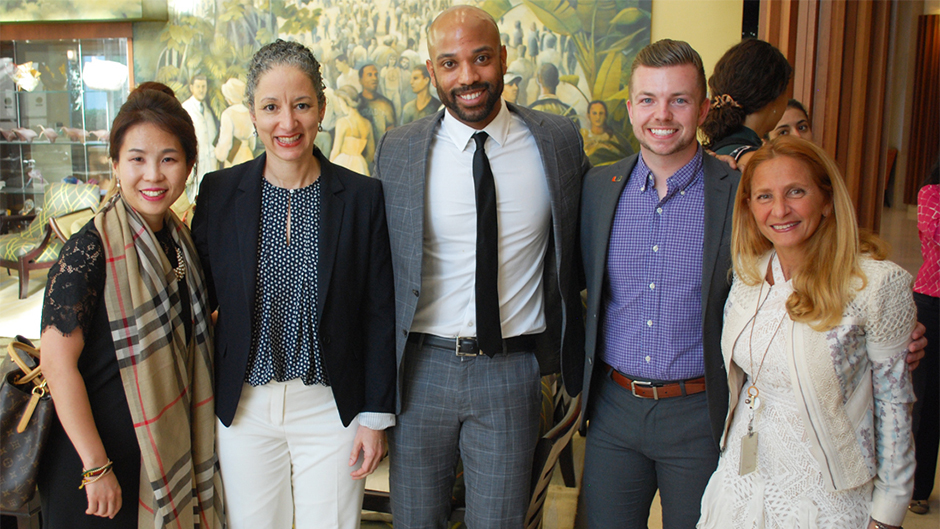“We need to help educate, inform, and inspire others and develop public policy that supports individual and community well-being,” said Laura Kohn-Wood, dean of the School of Education and Human Development. “It’s an issue that spans psychology, medicine, public health, and legislation.”
Kohn-Wood welcomed more than 100 attendees to the discussion, “Tackling Opioid Addiction, Implications for Prevention and Treatment,” on February 24 at the Newman Alumni Center. The panel was organized by Soyean Ahn, chair of the Department of Educational and Psychological Studies (EPS), whose counseling psychology program is celebrating 10 years of American Psychological Association accreditation.
“A huge number of our counseling students’ clients have substance abuse disorders, including their friends, neighbors and other professionals,” said panelist Ellen Vaughan, Ph.D. ’06, associate professor of counseling psychology at Indiana University. “We need to shift their thinking away from the stigma or drug use, and ask the right questions so we can get them the help they need.”
Guillermo “Willy” Prado, dean of the University of Miami Graduate School, Leonard M. Miller Professor of Public Health Sciences, and director of the Division of Prevention Science and Community Health, moderated the discussion with Vaughan, Florida State Representative Michael Grieco, J.D. ‘99; Viviana Horigian, M.D. M.H.A., associate professor, Department of Public Health Sciences, Miller School of Medicine; Tyler Bartholomew, public health doctoral student; and Hansel Tookes, M.D., M.P.H., assistant professor of clinical medicine, Division of Infectious Diseases.
Noting that opioid overdoses claim 130 lives a day, Prado asked the panelists about their approaches to combating the nationwide epidemic. Vaughan said Indiana University committed $50 million for a variety of projects, including training more addiction counselors to help people with substance abuse disorders. “We are also leading a clinical trial of brief cognitive-behavioral therapy (CBT) intervention for adults with moderate disorders,” she said. Grieco said the State of Florida has created a 21-member task force looking at reforming the criminal justice system. “We want to move from punishment to treatment,” he said. “We recognize this as a crisis – not something that can be ignored.”
Horigian said Miller School clinicians and researchers are focusing on increasing access to prevention, treatment, and recovery services. “Medications have been proven to save lives, but we need to integrate prescribing into primary care centers and develop a collaborative care model,” she said. “We are also looking at extended-release formulations to improve adherence, as retention in treatment is associated with better outcomes and fewer hospitalizations.” Bartholomew has been active with the medical school’s IDEA (Infectious Disease Elimination Act) Exchange, a syringe service program launched in 2016 under the guidance of Dr. Tookes. “I have seen how this harm reduction strategy is saving lives,” said Bartholomew, who reported that overdose deaths in Miami-Dade County have fallen from 320 in 2016 to about 200 in 2018. “We keep people alive and engaged, and provide them with treatment when they are ready,” he added.
However, Bartholomew also warned that cocaine and heroin use are both on the rise and could become the next major drug epidemic.
All panel members agreed that physicians, counselors and other professionals should treat opioid drug users like patients with other chronic conditions. “Stigma is a real issue at all levels,” said Tookes. “To overcome that, we need to treat drug users with respect and compassion whenever we see them.”
Multidisciplinary Panel Examines Opioid Addiction Interventions

